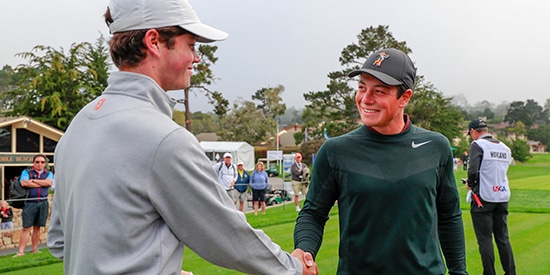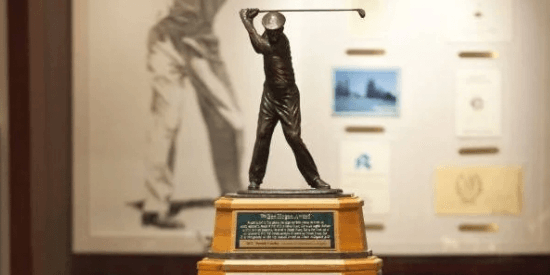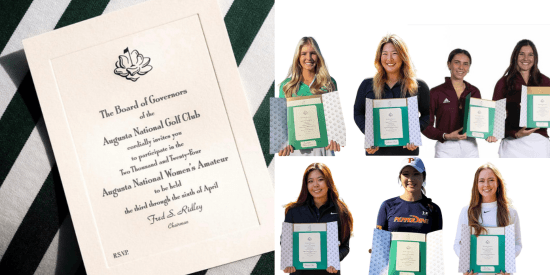U.S. Amateur: Hovland over Hammer, will meet Bling in final
August 18, 2018 | by Julie Williams of AmateurGolf.com
see also: Devon Bling, View results for US Amateur, Merion Golf Club - East Course

Viktor Hovland and Devon Bling will meet in a 36-hole, all-college final Sunday at Pebble Beach Golf Links
Hammer, an 18-year-old headed to the University of Texas this fall, authored a head-turning week at Pebble Beach in his second U.S. Amateur. But in Saturday's semifinal, he went 2 down to Oklahoma State’s Viktor Hovland after 3 holes and was behind the eight-ball from that point on.
Hovland made quick work of his last two opponents – needing only 12 holes to move on – but Hammer kept fighting. Hammer birdied Nos. 5 and 6 to get back to all square but immediately went down again when Hovland birdied No. 7.
“I'm not mad about the way I played,” Hammer said. “I'm just disappointed that I kind of ran into a buzz saw.”
The semifinals seem to have Hammer’s number. Last month’s U.S. Junior run ended in the semifinals, too. It stung a little, and Hammer wore a Baltusrol-logoed cap this week (Baltusrol hosted the U.S. Junior) to remind himself of that loss.
As for Hovland, from Norway, this is only his second start at the U.S. Amateur and his deepest run. Hovland said he has really only won one significant tournament in the U.S., and that was a college event. After winning his last two U.S. Amateur matches by a 7-and-6 margin, Hovland beat Hammer on the 16th hole.
Hovland made eight birdies on Saturday, and he needed every one.
“Cole was playing good golf and I knew that if I wanted to win holes, I needed to make some birdies,” he said. “The first birdie on 10, when I made a nice putt, kind of got the confidence up a little bit even though I missed a short putt on 11, I was able to bounce back with a birdie on 12. From there, I just felt really nice over the ball.”
Hovland will meet UCLA sophomore Devon Bling in Sunday’s 36-hole final after Bling pulled a similar trick in the semifinals, defeating Isaiah Salinda, 1 up. A Stanford senior, Salinda has been on a hot streak this summer after winning the Pacific Coast Amateur last month. He also advanced to the 16-man match-play bracket at the Western Amateur.
Bling had six birdies on Saturday, and went into No. 18 with a 1-up lead. He took the victory with a routine par.
“She was always positive, always kept me going,” he said Friday after his quarterfinal victory. “I know she's still in my heart and she's looking down on me and watching me. I'm just hoping to make her proud.”
Bling’s family is at Pebble Beach in force this week, supporting him. UCLA assistant coach Andrew Larkin came in Monday night to offer some guidance, too. Larkin picked up Bling's bag beginning in the second round of stroke play and kept his player calm mentally. It has helped Bling take it one step at a time.
“I think his confidence has grown every day, which has been really fun to watch as a coach,” Larkin said. “You can tell he’s gearing up to win.”
Bling entered college at 17 years old, and lacked some consistency. Larkin said that piece has come together. Larkin’s message is to not beat yourself – make your opponent beat you on any given hole. Bling has delivered. Should he win, Bling would be the first UCLA player to put his name on the Havemeyer Trophy.
No matter what happens on Sunday, Hovland and Bling already have a ticket to next year’s Masters. For Bling, about to enter his sophomore year at UCLA, it’s a lot to process.
“I’m still soaking it in,” he said. “I still can’t believe it’s happening, it’s going to be a little bit before I realize everything I’ve accomplished.”
The final piece could come on Sunday.
Results: US Amateur
| Place | Player | Location | Pts | Scores |
|---|---|---|---|---|
| Win | , Norway | 2000 | ||
| Runner-up | Ridgecrest, CA | 1500 | ||
| Semifinals | Houston, TX | 1000 | ||
| Semifinals | South San Francisco, CA | 1000 | ||
| Quarterfinals | Hattiesburg, MS | 700 |
About the US Amateur
The U.S. Amateur, the oldest USGA championship, was first played in 1895 at Newport Golf Club in Rhode Island. The event, which has no age restriction, is open to those with a Handicap Index of .4 (point four) or lower. It is one of 15 national champ...
Most Popular Articles

FINAL RESULTS: 2026 Australian Men’s Amateur Championship
Feb 6, 2026Billy Dowling pulled away with a closing 7-under 63 to win the 2026 adidas Australian Men’s Amateur Championship at 18-under.
2026 Ben Hogan Award Watch List: 35 Names to Know This Spring
Jan 29, 2026The 2026 Ben Hogan Award watch list is out—35 college golf standouts are in the early mix for the game’s top individual honor.
Koivun powers Auburn to breakthrough Amer Ari victory
Feb 7, 2026Koivun’s 25-under week sparks Auburn’s record-setting win in Hawaii
Titleist Fitting Philosophy: The Competitive Amateur’s Fastest Path to Lower Scores
Jan 26, 2026Competitive golf is a game of small edges. Titleist’s fitting approach combines expert human insight and honest data
Early Invites Announced for the 2026 Augusta National Women’s Amateur
Jan 24, 2026A running list of the first confirmed names headed to Augusta.